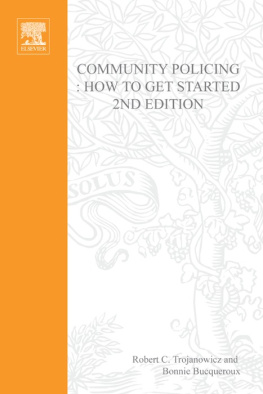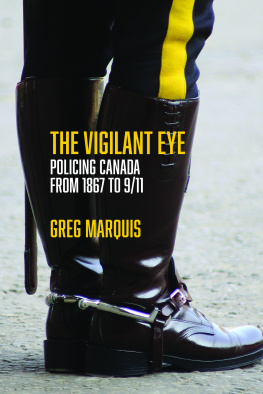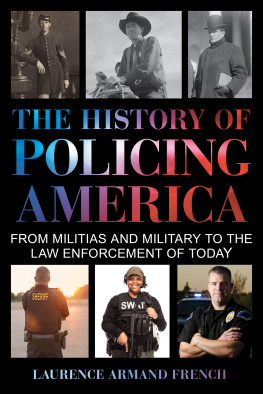BEYOND COMMUNITY POLICING
BEYOND COMMUNITY POLICING
FROM EARLY AMERICAN BEGINNINGS TO THE 21ST CENTURY
James J. Chriss
First published 2011 by Paradigm Publishers
Published 2016 by Routledge
2 Park Square, Milton Park, Abingdon, Oxon OX14 4RN
711 Third Avenue, New York, NY 10017, USA
Routledge is an imprint of the Taylor & Francis Group, an informa business
Copyright 2011, Taylor & Francis.
All rights reserved. No part of this book may be reprinted or reproduced or utilised in any form or by any electronic, mechanical, or other means, now known or hereafter invented, including photocopying and recording, or in any information storage or retrieval system, without permission in writing from the publishers.
Notice:
Product or corporate names may be trademarks or registered trademarks, and are used only for identification and explanation without intent to infringe.
Library of Congress Cataloging-in-Publication Data
Chriss, James J., 1955-
Beyond community policing : from early American beginnings to the 21st century / James J. Chriss.
p. cm.
Includes bibliographical references and index.
ISBN 978-1-59451-846-1 (hbk. : alk. paper)
1. Police--United StatesHistory. 2. Community policingUnited StatesHistory. 3. Police-community relationsUnited StatesHistory. I. Title.
HV8138.C535 2011
363.230973--dc22
2010025257
ISBN 13 : 978-1-59451-846-1 (hbk)
ISBN 13 : 978-1-59451-847-8 (pbk)
Designed by Straight Creek Bookmakers.
Contents
This book represents my admittedly limited attempt to contribute to the study of police and society. The sociologists I have looked up to over the yearsParsons, Ward, and Gouldner most immediatelyworked in the area of grand or cosmo-logical theorizing, and this is the perspective on which I cut my teeth. For me cosmological grand theory is useful because every once in awhile, whenever the spirit moves me, I can climb down from those dizzying heights and try to grapple with any particular substantive topic in real time. Recently my chosen substantive topic has been policing and the criminal justice system, so this book is simply a reflection of how I make sense of this field going back and forth between grand sociological theory, pertinent criminological theories, and the rapidly growing scholarly literature on policing.
Each of us has tastes for certain topics, and when considering all the possible topics within criminal justice, my penchant has always been toward policing rather than the other two major subsystems, namely courts and corrections. More than the other two, for me policing is where the action is. Unlike the drudgery of plowing through the scholarly literature in sociology and criminology writ large, I actually look forward to reading the latest issues of scholarly journals in the policing field. And of course, books and monographs on various aspects of policing are important and worthwhile as well. Although Egon Bittner has been the single most influential police scholar informing my take on policing, there are of course others who deserve mention. Some of the scholars listed here I have been in contact with over the years or during the writing of this book, while others I have only read but certainly appreciate from afar. In addition to Bittner, police scholars who have been important to me include Jerome Skolnick, Wesley Skogan, Michael White, Rod Brunson, Stephen Mastrofski, Peter Manning, Tim Prenzler, Jeremy Wilson, John Crank, David Klinger, Eric Monkkonen, Steve Herbert, Carl Klockars, Donald Black, Sam Walker, and John Van Maanen. There are others of course, dutifully noted in the bibliography, but these are the ones that readily come to mind.
My family deserves a round of applause as well, perhaps even more so than the veritable list of Whos Who in policing offered above. My daughter Ariana asked interesting questions throughout the time of the writing of this book, and she is always a delight. Whenever I was home working on the book my son Johnny would come into the study and ask Are you finished yet? Sadly, most of the time I had to tell him no, that is until now. Yes, Johnny, I am through. Lets go play badminton. And my wife Mandy put up patiently with my many late nights buried in writing, reading, and printing countless versions of drafts of chapters. For these reasons and many more, I dedicate this book to them.
Some of the material that found its way into chapters of the book was presented as talks in various forums over the last seven years. In 2004 I presented the paper The Concept of Proactivity in Social and Criminal Justice Policy in Cleveland at the North Central Sociological Association meetings. In 2007 I presented the paper From Generalist to Specialist Back to Generalist: The Shifting Roles of Police over Time, in Atlanta at the annual meeting of the American Society of Criminology. Two versions of on police as contact men were presented as papers, the first as an invited lecture in 2008 before the Sociology Department at the University of Connecticut, and the second in 2009 at the annual meeting of the American Society of Criminology held in Philadelphia. In 2008 I presented a paper titled Institutionalism versus Functionalism: The Case of Post 9-11 Policing in St. Louis at the annual meeting of the American Society of Criminology. Finally, in 2009 I gave a talk to the SociologyCriminology Club at Cleveland State University on Policing in the Wild West. I of course thank alltoo numerous to mention individuallywho provided comments and feedback on these various talks.
Finally, I should mention that one of my students at Cleveland State University, Jason Scott, mentioned to me a book by Peter Moskos, Cop in the Hood, of which I was unaware. I ended up getting a copy of the book and it eventually made its way into the bibliography, thanks to Jason. It is students like Jason who fan the flames of eternal optimism about working in higher education.
James J. Chriss
Cleveland
September 2010
.Reprinted by permission of the publisher from The American University by Talcott Parsons and Gerald M. Platt, with contributions by Neil J. Smelser, p. 12, Cambridge, MA: Harvard University Press, Copyright 1973 by the President and Fellows of Harvard College.
Picture of Wild Bill Hickok in Used by permission of the Nebraska State Historical Society, reference number RG2603-6.
The quote on page 186Reprinted by permission of the publisher from Off the Books: The Underground Economy of the Urban Poor by Sudhir Alladi Venkatesh, p. 203, Cambridge, MA: Harvard University Press, Copyright 2006 by Sudhir Alladi Venkatesh.
1
Explaining the Police
On December 6, 2008, riots broke out in several Greek cities after word spread of the fatal police shooting of Alexandros Grigoropoulos, a fifteen-year-old youth living in Exarchia, a central district of Athens.1 The rioting started in Athens, then spread north to Thessaloniki, Komotini, Ionnina, and later as far south as Crete. Although as of mid-December, 2008 no deaths had been attributed to the rioting, there was substantial damage to banks and stores in the main shopping districts of these cities. Indeed, Greeces retail association estimated that the losses were at least 100 million Euros (about 135 million dollars).
Two officers involved in the shooting were immediately suspended pending further investigation, and Greek authorities pleaded with the rioters to stop the violence. There had been longstanding tense relations between the police and anarchists who viewed Exarchia as their fortress or home base. Indeed, the last round of serious rioting in Greece occurred twenty years earlier, and it too pitted anarchists against the local police. The rioters eventually moved inside the gates of Athens University, where they took sanctuary thanks to a Greek law which bars police from university campuses. Now ensconced safely out of reach of the police, the rioters were free to pelt them with rocks, bottles, and whatever else was available.





